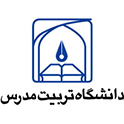خلاصة:
یسعی البحث الحالی لمعرفه دور مکونات الذکاء العاطفی عند معلمی ماده " الإنشاء" وفاعلیتها فی التکهن بأبعاد الإبداع الکتابی عند التلامیذ المتعلمین. ونعتمد فیه المنهج الوصفی– الترابطی. شکّلت 241 طالبه فی المرحله الدراسیه العاشره(المتوسطه) عینه البحث إضافه إلی 10 معلمات لماده الإنشاء فی الفصل الدراسی لعام 98-97 فی مدینه قم، وقد تمّ اختیار هؤلاء الطالبات عبر طریقه الاختیار العنقودی ذات المراحل المختلفه وبشکل عشوائی وتم تقییمهن باستخدام استمارات تورانس للتفکیر الإبداعی والذکاء العاطفی بار آن. ؛ إن نتائج التحلیل الترابطی والانحدار الخطی ذی المتغیرات المتعدده أظهرت أن هناک علاقه داله بین المهارات الفردیه لدی المعلمین وبین قدره التلمیذ علی الإبداع وتمکنه من الإنتاج وکذلک هناک علاقه داله بین إداره التوتر لدی المعلمین وبین الإبداع والابتکار لدی المتعلمین والمرونه فی نشاطهم. وتتیح المهارات الفردیه لدی المعلمین القدره علی تکهن بإبداع التلامیذ، وکذلک تسهل إداره التوتر لدی المعلمین قدره التکهن فی إبداع المتعلم ومرونته فی التعلم والفهم. کما أن الخلق العام لدی المعلمین یسهل إمکانیه التکهن بتوسع التلمیذ والمتعلم فی الإبداع والإنتاج. إن نتائج الدراسه تؤکد أهمیه مکونات الذکاء العاطفی لدی المعلمین من أجل تنمیه أبعاد الإبداع لدی التلامیذ والمتعلمین. وعلیه تتجلی ضروره عقد دورات تربویه للمعلمین من أجل تعزیز مکونات الذکاء العاطفی لدیهم وبیان دورها وأهمیتها فی العملیه التعلیمیه.
The present study is aimed at determining the role of teachers' emotional intelligence components (composition class) in predicting the aspects of creativity (writing) among students. A descriptive-correlation method is adopted in the course of this study. The sample includes 291 students of the 10th grade as well as 10 composition teachers from the city of Qom in the academic year of 2018-2019. They were selected through multi-stage random cluster sampling and were evaluated by Torrance Test of Creativity and BarOn Emotional Intelligence Questionnaire. The results of correlation analysis and multivariate regression indicated that there is a meaningful relationship between teachers' interpersonal skills and innovation and the elaboration of creativity among students. Also, there is a meaningful relationship between teachers' stress management and flexibility, innovation and elaboration of the students. The results also indicated that teachers' interpersonal skills meaningfully predict innovation and expansion in students; their stress management meaningfully predicts flexibility and innovation in students; and their general mood meaningfully predicts the elaboration of students' creativity. The results of the present study support that the emotional intelligence components of teachers are significant to foster the aspects of students’ creativity. Therefore, holding Teacher Training Emotional Intelligence Course seems to be necessary.
(پژوهیار,
,
,
)
